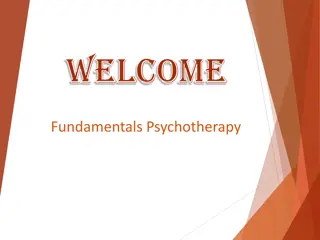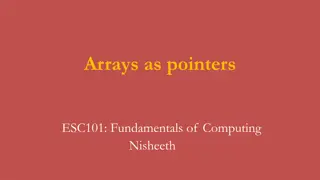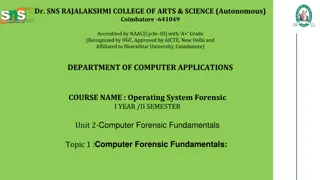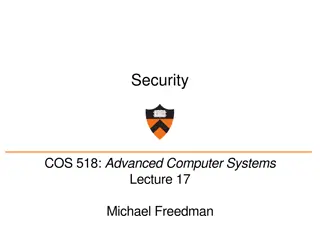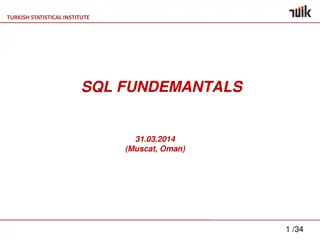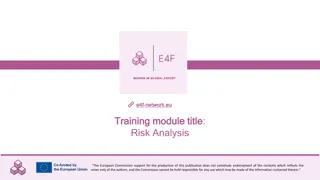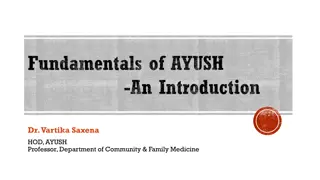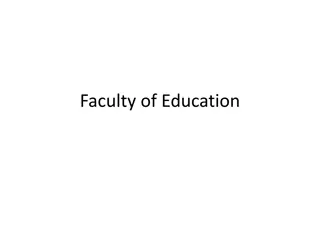FUNDAMENTALS
Ethics play a pivotal role in shaping a stable and civilized society. Understanding right from wrong is crucial for personal growth and societal harmony. Ethical values like fairness, honesty, and responsibility are the foundation of a well-functioning community. Without ethics, individuals lack a moral compass, leading to chaos and instability. Upholding ethical principles fosters credibility, unity, and fulfillment of basic human needs in organizations and society at large.
Download Presentation

Please find below an Image/Link to download the presentation.
The content on the website is provided AS IS for your information and personal use only. It may not be sold, licensed, or shared on other websites without obtaining consent from the author.If you encounter any issues during the download, it is possible that the publisher has removed the file from their server.
You are allowed to download the files provided on this website for personal or commercial use, subject to the condition that they are used lawfully. All files are the property of their respective owners.
The content on the website is provided AS IS for your information and personal use only. It may not be sold, licensed, or shared on other websites without obtaining consent from the author.
E N D
Presentation Transcript
FUNDAMENTALS OF ETHICS & PROFESSIONALISM
Why study ethics? Ethics is a central component of any happy, healthy, and mature life. Knowing right from wrong is one of the qualifications for being a fully functional adult.
ethos (The Science of Morals) ethice ethique ethic
Ethics is concerned with what is right or wrong, good or bad, fair or unfair, responsible or irresponsible, obligatory or permissible, praiseworthy or blameworthy.
It is associated with guilt, shame, indignation, resentment, empathy, compassion, and care. It is interested in character as well as conduct.
Why are ethics important? Ethicsare important because without ethics people would not have ideas of right and wrong. Ethics help to make the society more stable. Ethics help to choose right actionsover wrong one. Ethics is very important since it is an essential part of the basic civilized society, so the society with lack of ethics will fail sooner or later.
In addition ethics is important because of the following: 1.Satisfying Basic Human Needs: Being fair, honest and ethical is one the basic human needs. Every employee desires to be such himself and to work for an organization that is fair and ethical in its practices.
2.Creating Credibility: An organization that is believed to be driven by moral values is respected in the society even by those who may have no information about the working and the businesses of an organization. Microsoft, for example is perceived as an organization for good corporate governance and social responsibility initiatives. This perception is held far and wide even by those who do not even know what business the organization is into.
3.Uniting People and Leadership: An organization driven by values is valued by its employees also. They are the common thread that brings the employees and the decision makers on a common platform. This goes a long way in align behaviors within the organization towards achievement of one common goal or mission.
4.Improving Decision Making: A man sdestiny is the sum of all the decisions that he/she takes in course of his life. The same holds true for organizations. Decisions are driven by values. For example an organization that does not value competition will be fierce in its operations aiming to wipe out its competitors and establish a monopoly in the market.
5.Long Term Gains: Organizations guided by ethics and values are profitable in the long run, though in the short run they may seem to lose money. Toyota group, one of the largest business firm in Japan was seen on the verge of decline at the beginning, which soon turned out to be otherwise.
6.Securing the Society: Often ethics succeeds law in safeguarding the society. The law machinery is often found acting as a mute spectator, unable to save the society and the environment. Technology, for example is growing at such a fast pace that the by the time law comes up with a regulation we have a newer technology with new threats replacing the older one. Lawyers and public interest litigations may not help a great deal but ethics can.
What are the key elements of a proper Ethics? A proper foundation of ethics requires a Standard of Value to which all goals and actions can be compared to. This standard is our own lives, and the happiness which makes them livable. This is our ultimate standard of value, the goal in which an ethical man must always aim. It is arrived at by an examination of man's nature, and recognizing his peculiar needs.
A system of ethics must further consist of not only emergency situations, but the day to day choices we make constantly. It must include our relations to others, and recognize their importance not only to our physical survival, but to our well-being and happiness. It must recognize that our lives are an end in themselves, and that sacrifice is not only not necessary, but destructive.
Key Terms For Lecture 1 Profession Professional Morals
Profession: Is a type of job that requires special education, training, or skill. A profession is an occupation founded upon specialized educational training, the purpose of which is to supply objective counsel and service to others, for a direct and definite compensation, wholly apart from expectation of other business gain.
Examples of PROFESSION: The doctor talked to students who are thinking about entering the profession. Most professions in the medical field require years of training. Their daughter recently became a member of the medical profession.
Professional: A professional is a member of a profession. The term also describes the standards of education and training that prepare members of the profession with the particular knowledge and skills necessary to perform the role of that profession. Doctors in many countries take the Hippocratic Oath upon entering the profession, as a symbol of their commitment to upholding a number of ethical and moral standards.
Professional Cntd. relating to a job that requires special education, training, or skill done or given by a person who works in a particular profession paid to participate in a sport or activity
Examples of PROFESSIONAL: Do you have any professional experience? You should seek professional advice. a golfer who recently turned professional I was impressed by the calm and professional way she handled the crisis. The presentation was very professional.
Difference b/w Morals and Ethics? Morals define personal character, While Ethics stress a social system in which those morals are applied. In other words Ethics point to standards of behavior, This could be National Ethics, Social Ethics, Company Ethics Professional Ethics or even Family Ethics.
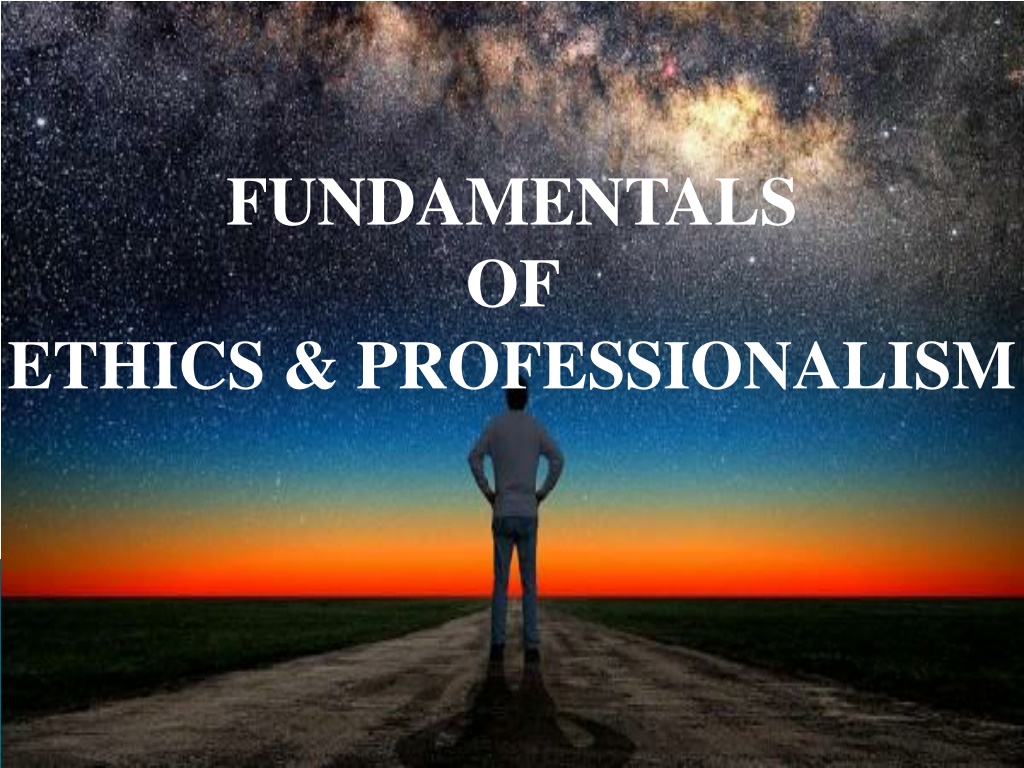
 undefined
undefined












